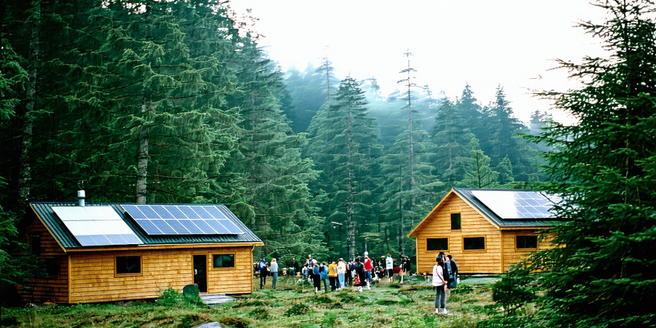
Introduction to Sustainable Business Retreats
In recent years, businesses have increasingly recognized the importance of sustainability, sparking a rise in eco-friendly retreats. Such retreats provide companies an opportunity to align their organizational goals with sustainable practices. These retreats are designed not just for relaxation or strategic meetings, but they focus on minimizing environmental impact while fostering a deeper understanding of sustainability within the team. By engaging in activities such as nature walks, organic farming workshops, and eco-friendly team-building exercises, participants gain insight into sustainable living and the importance of preserving natural resources. As companies continue to integrate green practices, eco-friendly retreats offer a refreshing approach to corporate gatherings that support both business objectives and environmental sustainability.
Benefits of Eco-friendly Retreats for Organizations
Eco-friendly retreats offer a multitude of benefits for organizations seeking to adapt sustainable practices. Firstly, they present a platform for demonstrating a company’s commitment to environmental responsibility, enhancing its brand image and stakeholder trust. They also promote team cohesiveness as participants bond over shared eco-conscious activities. These retreats encourage innovation, providing a space to brainstorm and align sustainability initiatives. Additionally, the tranquil setting of nature-inspired venues can enhance creativity and focus, leading to productive discussions. Importantly, eco-friendly retreats reduce carbon footprints by utilizing renewable energy, practicing waste reduction, and prioritizing local resources. Overall, they serve as a powerful tool for organizations dedicated to making a positive environmental impact while strengthening team dynamics.
Choosing the Right Location for Your Green Retreat
Selecting the perfect location for a green retreat is crucial to its success. Ideally, the venue should be accessible via sustainable transportation options like public transit or carpooling to minimize travel emissions. Eco-renovated lodges, organic farms, or nature reserves often provide the ideal backdrop for corporate gatherings focused on sustainability. It’s important to choose a venue that practices its own version of sustainability through energy efficiency, waste reduction, and eco-certification. Additionally, proximity to natural attractions such as forests, lakes, or wildlife sanctuaries enriches the retreat experience, offering ample opportunities for nature immersion and eco-friendly activities. Finding local organic suppliers for food and resources reinforces a commitment to the local community and environment.
Incorporating Sustainable Practices in Retreats
Incorporating sustainable practices into retreats can greatly enhance their impact and effectiveness. Start by selecting venues that prioritize renewable energy sources and sustainable architecture. Utilize eco-friendly transport methods such as bicycles or electric vehicles to reduce carbon emissions during the retreat. Introduce zero-waste policies by providing reusable containers and utensils, and focus on locally-sourced, organic meals to support regional economies while reducing food miles. Offer workshops on topics like composting or permaculture to educate participants on sustainability. Encourage digital documentation over paper to minimize waste. By integrating these practices, retreats not only leave a minimal footprint on the environment but also educate attendees on the importance of sustainability, leading to a broader influence beyond the retreat itself.
Enhancing Team Bonding Through Environmental Awareness
Eco-friendly retreats can significantly enhance team bonding by fostering a shared commitment to environmental awareness. Activities like group nature walks, wildlife conservation projects, and team challenges in natural settings encourage collaboration and communication among team members. These experiences not only help develop teamwork skills but also nurture a sense of collective responsibility towards the environment. Workshops on sustainability practices can be both informative and engaging, promoting mutual learning and idea exchange, which strengthens professional relationships. Furthermore, retreat settings often strip away the formalities of the office environment, allowing individuals to connect on a more personal level. By integrating environmental consciousness into team-building activities, organizations can cultivate a more cohesive, motivated, and environmentally aware workforce.
Future of Sustainable Retreats in Business Culture
As the emphasis on environmental sustainability grows, the future of sustainable retreats in business culture looks promising. These retreats are evolving from niche activities into mainstream corporate practices. Companies are increasingly recognizing their value in promoting sustainable development goals, enhancing corporate reputation, and engaging employees in meaningful environmental stewardship. Technological advancements are providing new opportunities for eco-innovation in these retreats, such as using digital tools to measure and reduce carbon footprints. The ongoing global focus on sustainability is likely to accelerate the adoption of eco-friendly retreats, positioning them not only as a trend but as a critical strategy in fostering long-term sustainable growth for businesses. As more organizations prioritize environmental consciousness, sustainable retreats are anticipated to be integral to their culture and operational strategy.
